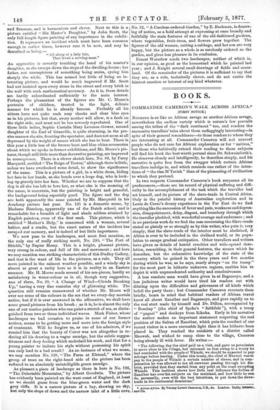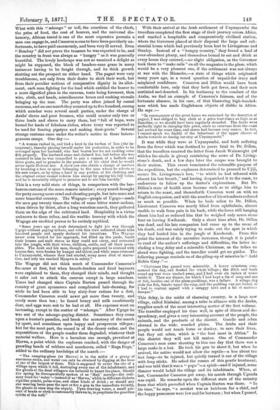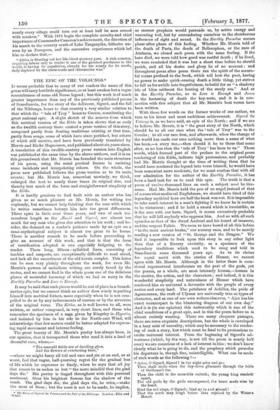BOOKS.
COMMANDER CAMERON'S WALK ACROSS AFRICA.*
[FIRST NOTICE.]
NOTHING is so like an African savage as another African savage, nevertheless the endless variety which is nature's law prevails. among the tribes of the "dark continent" too, and renders the. successive travellers' tales about them unflaggingly interesting—in spite of their general resemblance—to those readers to whom they are interesting at all. Commander Cameron will not convert people who do not care for Africati exploration or for "natives," but those who habitually extend their reading to these subjects. will find his book the best worth perusal since Dr. Schweinfiirth's. He observes closely and intelligently, he describes simply, and his narrative is quite free from the swagger which certain African travellers indulge in, and which reminds one rather of the inten- tions of "the clan M'Tavish " than of the pioneering of civilisation to which they pretend.
In two respects Commander Cameron's book surpasses all ita predecessors,—these are its record of physical suffering and diffi- culty in the accomplishment of the task which the traveller had set himself, and its picture of the slave-trade in Central Africa. Only in the painful history of Australian exploration and in Louis de Carne's dreary experience in the Far East do we find anything like the succession of fever and pain, weakness and depres- sion, disappointment, delay, disgust, and treachery through whicl. the traveller plodded, with wonderful courage and endurance ; and in no previous work do we find the case concerning the Slave-trade- stated so plainly or so strongly as by this writer, who puts it, very simply, that the slave-trade of the interior must be abolished, if Africa is ever to be included in the civilised world, or its popu- lation to escape gradual extirpation. Other travellers and writers. have given us details of horrid cruelties and wide-spread deso- lation, resembling, in their general features, the scenes which he describes, but the exhaustive knowledge of the state of the- country which he gained in the three years and five months. during which he was, as he says, nearly always "on the tramp" for the most part in hitherto unknown regions, enables him to. depict it with unprecedented authority and conclusiveness.
A less resolute man would have given in at Bagamoyo, and a less judicious writer would have tired his readers out with dilating upon the difficulties and grievances of all kinds which befell the party there ; but Commander Cameron recounts them briefly, bears in mind that habitual readers of African travel know all about Zanzibar and Bagamoyo, and goes rapidly on to. the real start made by himself and Dr. Dillon, accompanied by " Bombay " (the chief of Speke's " faithfuls "), with a troop of " pagazi " and donkeys from Kikoka. Early in his narrative the author makes an important statement respecting the real position of the Sultan of Zanzibar, which puts the conduct of our recent visitor in a more excusable light than it has hitherto been placed in. They reached the outskirts of a district called Msuwah, and wished to camp close to the village, Cameron. being already ill with fever. He writes :—
" The following day the chief paid us a visit, and gave us permission to move close to his village, but informed us that owing to a treaty he- had concluded with the people of Whindd, we should be expected to pay, mhongo before leaving. Under this treaty, the chief of Msawah was to pay to the people of Whindd a certain number of slaves, and in com- pensation he was allowed to tax all caravans passing through his dis- trict, provided that they started from any point on the coast excepting Whinde. This incident shows how little real influence the Sultan of Zanzibar has over his subjects on the mainland, and how little he eau- do, personally, even with the best intentions, to put down the slave-- trade in his continental dominions."
*Across Africa. By Verney Lovett Cameron, C.B., &a. London: Deldy,Iebister,. and Co. What with this " mhongo " or toll, the exactions of the chiefs, the price of food, the cost of bearers, and the universal dis- honesty, African travel is one of the most expensive pursuits a man can engage in, and Cameron seems to have been peculiarly un- fortunate, to have paid enormously, and been very ill served. Even 6, Bombay " did not prove the treasure he was expected to be, and the country in front was always as " hungry " as it was generally beautiful. The lovely landscape was not so unmixed a delight as In'ght be supposed, the block of bamboo-cane grass in many instances having to be fought through, and its thick growth shutting out the prospect on either hand. The pagazi were very troublesome, not only from their desire to shirk their work, but from their peculiar notions of comparative dignity in its allot- ment, each man fighting for the load which entitled the bearer to a more dignified place in the caravan, tents being foremost, then wire, cloth, and beads, miscellaneous boxes and cooking utensils bringing up the rear. The party was often joined by casual caravans, and on one march they counted up to five hundred, among which number were several small parties, under the charge of Arabs' slaves and poor freemen, who could muster only two or three loads and slaves to carry them, but "full of hope, were bound for lands of fabulous riches, where ivory was reported to be used for fencing pigstyes and making door-posts." Several strange customs came under the writer's notice in these hetero- geneous camps. One day :— "A woman rushed in, and tied a knot in the turban of Issa (the in- terpreter), thereby placing herself under his protection, in order to be revenged upon her husband, who had beaten her for not cooking some fish properly. The husband came and claimed her, but before she was restored to him he was compelled to pay a ransom of a bullock and three goats, and to promise in the presence of his chief that he would never again ill-treat her. A slave can also obtain a change of masters by breaking a bow or spear belonging to the man whom be selects as his new owner, or by tying a knot in any portion of his clothing, and the original owner cannot redeem him except by paying his full value, and he is invariably obliged to promise not to use him harshly."
This is a very mild state of things, in comparison with the bar- barous customs of the more remote interior ; every march brought the party among more cruel and cheating people, but into more and more beautiful country. The Wagogo—people of Ugogo—made the men pay twenty times the value of some bitter water-melons, when driven by thirst, after a long waterless march, they gathered them on the edge of the cultivated land. Hospitality is a virtue unknown to these tribes, and the warlike bravery with which the Wagogo are credited proves to be entirely mythical.
"Some years ago an Arab determined to fight his way through ligogo without paying tribute, and with this view collected about nine hundred people and openly declared his intentions. The Wagogo never even waited for his approach, but filled up the pools, burnt their houses and such stores as they could not carry, and retreated into the jungle, with their wives, children, cattle, and all their move- ables. The Arab and his men, though quite prepared to contend with human foes, were beaten by hunger and thirst, and while some returned to ljnyanyemb6, whence they had started, many more died of starva- tion, and only ten reached lipapwa in safety."
The Wagogo did not think much of Commander Cameron's fire-arms at first, but when breech-loaders and fixed bayonets were explained to them, they changed their minds, and thought it safer not to attack the caravan except in large numbers. Times had changed since Captain Burton passed through the country of great sycamores and complicated hair-dressing, for while be had been able to buy sixty-four rations for a doti, Commander Cameron could never get more than twenty, and rarely more than ten ; he found honey and milk exorbitantly dear, and eggs were not to be had at all. His expenses went on increasing, except in the matter of " mhongo." After Ugogo he was out of the mhongo-paying district. Sometimes they come upon a hunter's paradise, and break the monotony of the march by sport, and sometimes upon happy and prosperous villages ; but for the most part, the record is of the dreary order, and the Superstitions of the people render them degraded, whatever their material welfare. Here is a harmless one enough, prevalent at Mama, a point which the explorers reached, with the danger of prowling bands of robbers and murderers, called " Ruga Ruga," added to the ordinary hardships of the march :— "The camping-place (at Mama) is in the midst of a group of enormous rocks, and water can only be obtained by digging at the base of one of the largest of them. This is supposed to cover the site of a village upon which it fell, destroying every one of the inhabitants, and the ghosts of the dead villagers are believed to haunt the place. Should the spring be disrespectfully spoken of as 'Map.' merely—the ordi- nary: word for' water '—instead of as Mama,' which in different dialects signifies pombd, palm-wine, and other kinds of drink; or should any one wearing boots pass the spot or fire a gun in the immediate vicinity, the ghosts at once stop the supply. Upon drawing water, a small pre-
sent of beads or cloth is customarily thrown in, to propitiate the guardian spirits of the well."
With their arrival at the Arab settlement of Unyanyembe the travellers completed the first stage of their journey across Africa, and reached a hospitable and comparatively civilised station, where the Governor placed at their disposal the large and sub- stantial house which had previously been lent to Livingstone and Stanley. Instead of a "hungry country," they found a land of over-abundant plenty, and themselves bound to eat and drink at every house they entered,—no slight obligation, as the Governor took them to "make calls" on all the magnates in the place, which would be a very pleasant one, if the settlement was not always at war with the Misambo,—a state of things which originated many years ago, in a vexed question of unpaid-for ivory and misplaced confidence. Cameron and Dillon would have been comfortable here, only that they both got fever, and their men mutinied and deserted. In his testimony to the conduct of the Arabs, we find an example of Cameron's fairness, and of the fortunate absence, in his case, of that blustering high-handed- ness which has made Englishmen objects of dislike in Africa.
He says :—
" In consequence of the great losses we sustained by the desertion of pagazi, I was obliged to buy cloth at a price four-times as high as at Zanzibar, or we should have been regularly stranded. The Arabs were perfectly right in charging this price, since no caravans from the coast had arrived fer some time, and stores had become very scarce. In fact, I cannot speak too highly of the behaviour of the upper classes of Arabs towards us during our stay at Unyanyembd."
It was while they were at ITnyanyemb6, and both suffering from the fever which was destined to prove fatal to Dr. Dillon, that the travellers received the letter from Jacob Wainwright (of which a fac-simile is given) containing the news of Dr. Living- stone's death, and a few days later the corpse was brought to their station. This event terminated the ostensible purpose of the expedition, but the explorers determined to proceed to Ujiji, secure Dr. Livingstone's box, " to which he had referred with almost his last breath," and having despatched it to the coast, to endeavour to follow up the doctor's explorations. But Dr.
Dillon's state of health soon became such as to oblige him to return to the coast, and thenceforth Cameron went on with no English companion, and with the number of his attendants reduced as much as possible. When he bade adieu to Dr. Dillon, Lieutenant Cameron was nearly blind from ophthalmia, almost unable to walk from pain in his back, while the fever still hanging about him had so reduced him that he weighed only seven stone four on leaving Kwiharah. Only a short time after, Dr. Dillon was dead, and his late companion had come up to the scene of his death, and was vainly trying to make out the spot in which they had buried him in the jungle at Kasekerah. From this
point the interest of the narrative increases, though it is painf ii to read of the author's sufferings and difficulties, the latter in-
cluding a long delay and a miserable Christmas, as the tribes on ahead were fighting, and the traveller could get no guides. The following passage reminds us of the piling-up of miseries in" Auld Robin Gray :"—
" Christmas Day passed very miserably. A heavy rainstorm com- menced the day, and flooded the whole village ; the ditch and bank round my tent were washed away, and I had over six inches of water inside it. Then my dinner, for which I had kept a tin of soup and one of flab, besides one of the plum-puddings, was a failure. A village dog stole the fish, Sambo upset the soup, and the pudding was not boiled, so I had to content myself with a scraggy fowl and a bit of matama damper."
This delay, in the midst of charming country, in a large new village, called Kisinen6, among a tribe in alliance with the Arabs, supplies much of the most interesting matter of the first volume. The traveller employed his time well, in spite of illness and de- spondency, and gives a very interesting account of the people, the animals, and the products of the district. Gazelle and zebra abound in the wide, wooded plains. The Arabs and their people would not touch horse or donkey, to save their lives, but they eat zebra, which is "the best meat in Africa." In this district they will not kill snakes. One of Commander Cameron's men came shouting to him one day that there was a large snake in a hut. He took his gun to shoot it, but when he arrived, the native would not allow the reptile—a boa about ten feet long—to be injured, but quietly turned it out of the village with long sticks. He asked the reason of this gentle treatment, and was told that it was a " pepo "—a spirit—and if injured, some disaster would befall the village and its inhabitants. When, at last, Commander Cameron got away, his march through Uganda was rapid. He remarks upon the different state of the country from that which prevailed when Captain Burton was there. "In his time," he says, "a musket was an heirloom for a chief, and the happy possessors were few and far between ; but when I passed,
nearly every village could tarn out at least half its men armed with muskets." With 1874 begin the complete novelty and chief importance of Commander Cameron's achievement, the direction of his march to the country south of Lake Tanganyika, hitherto un-
seen by an European, and the successive experiences which led
him to declare that,— "Africa is bleeding out her life-blood at every pore. A rich country, requiring labour only to render it ono of the greatest producers in the world, is baying its population, already far too scanty for its needs, daily depleted by the slave-trade and internecine war."








































 Previous page
Previous page